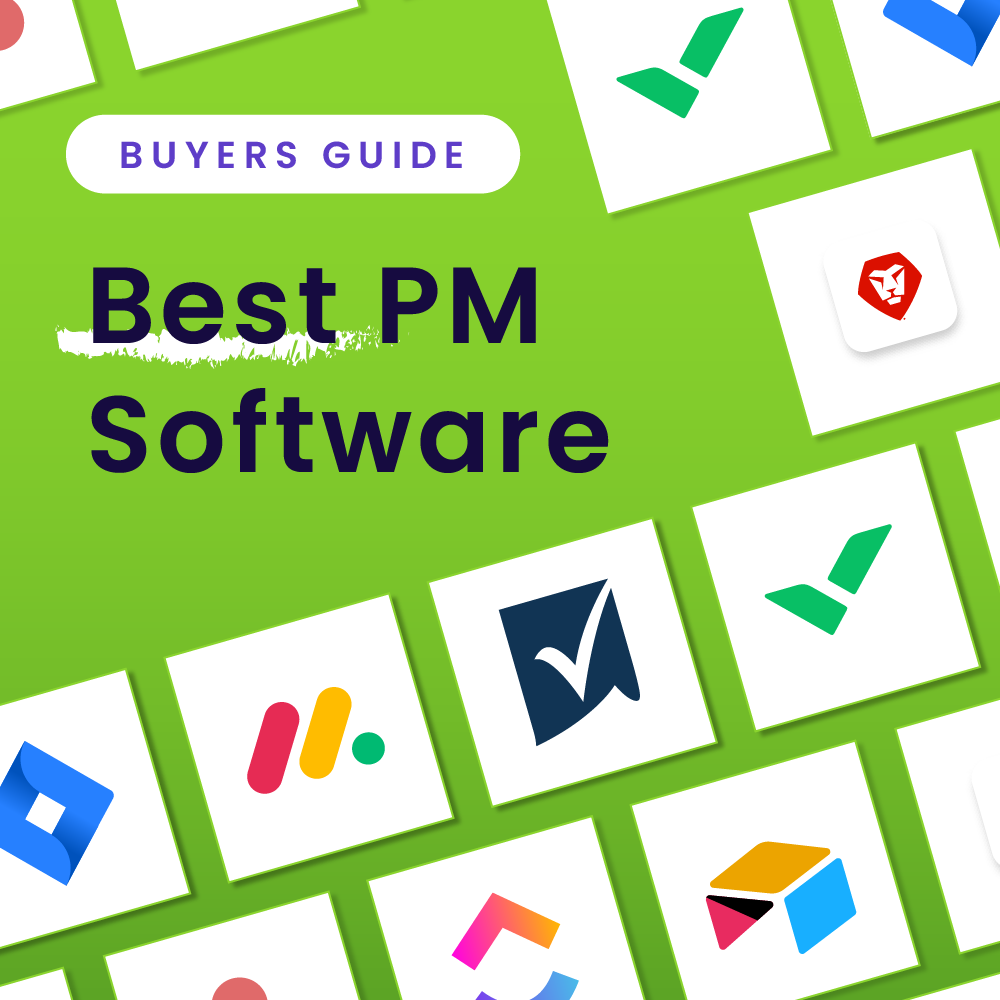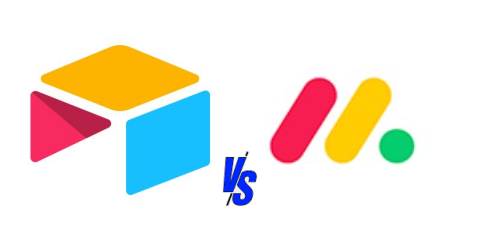With the help of today’s technologies, it is easy for a few individuals to create a startup or launch a small business with little initial investment. As such, there are now hundreds of millions of small businesses worldwide; small and midsize businesses represent about 90% of all global companies. Small business software manages and automates administrative tasks, helping owners focus on maximizing company growth and efficiency.
Table of Contents
- What Is Small Business Software?
- Best Small Business Software and Systems
- Types of Small Business Software
- Small Business Software Features
What Is Small Business Software?
Small business software is any solution or tool that helps a smaller organization with fewer resources to function and operate efficiently. These digital solutions enable a company to manage and maintain all aspects of the business, from high-level strategic planning to day-to-day task management, and from office administration and accounting to client-facing engagement and support.
Small business software provides an end-to-end solution, but with less depth and fewer advanced features. But what the software may lack in specialization is mostly countered by ease of setup and use, intuitive design, affordability, and simple integration to other applications. Also, many small business platforms are scalable and customizable, providing companies the advanced features they will need when they are ready.
Read more: Ways Project Management Can Help Your Business Grow
Best Small Business Software and Systems
Small business software provides several advantages especially when adopted and implemented at the right stage of the business. Here is a list of the best software for small businesses that can improve revenue flow, save time, cut costs, and boost workforce productivity.
monday work management & monday sales CRM
monday work management, also called monday.com, is a work operating system that provides small businesses with project and task solutions rooted in organization and overall workflow optimization. It is highly flexible, so users can customize many of its features to fit their specific needs. It centralizes all work and keeps teams connected over a single source of accurate and up-to-date business information. Users gain better control of company processes with its automation builder, customizable templates, dynamic dashboards, and integrations. The software’s intuitive interface is also easy to use by all staff without having to go through extensive training. Personalized support is available 24/7, with a range of self-learning tools accessible in its support center.
monday sales CRM is a customer relationship management solution that empowers sales teams to manage the entirety of the sales lifecycle with ease. Unique features, such as mass emailing, sales funnel visualization widgets, and pre-made “entity boards” designed for sales teams specifically make it easy to streamline operations while keeping tabs on the latest team data. What’s more, monday sales CRM pairs seamlessly with monday work management, making it a great add-on for existing monday users.

Pros
- Highly customizable for any type of project and industry
- Available integrations with many popular third-party tools
- Responsive support
Cons
- Pricing structure can be steep for a smaller organization
- The flexibility of the platform can result in developing non-standard processes
Smartsheet
Smartsheet is a dynamic workspace and collaboration software that can help small business owners execute plans effectively. Companies of all sizes can readily use the software with a familiar spreadsheet-like interface and no-code platform. It is applicable across business functions, from managing employee onboarding, to marketing, invoicing, billing, and project management.
Smartsheet has pre-built templates to help users quickly launch projects and initiatives. It is scalable and can accommodate a growing company’s requirements. Automatic status updates, task due date reminders, and approval requests streamline work so a small team can easily cope. Summary reports and dashboards provide a real-time view of company status and performance indicators, helping project owners and leadership make data-driven decisions.
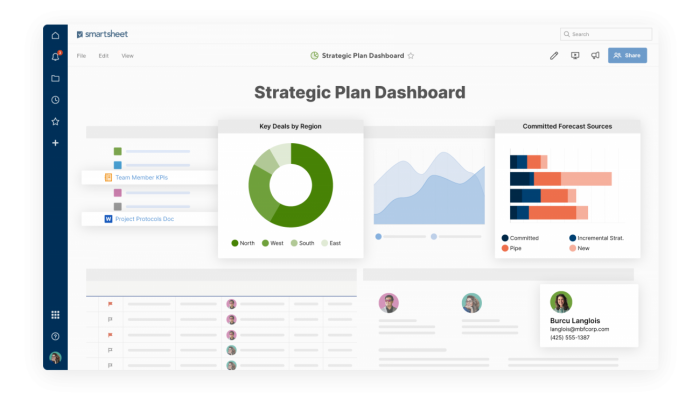
Pros
- Easy team collaboration
- Reporting capabilities
- Available add-ons for functionality extensions
Cons
- UI requires time for familiarization
- Other views depend on formatting within a sheet
Google Workspace
Google Workspace is an innovative solution for businesses of all sizes. Small businesses can access productivity and collaboration tools that users are familiar with, including Gmail, Calendar, Drive, Meet, Chat, Docs, Sheets, Slides, Forms, Keep, Apps Script, Cloud Search, Jamboard, and Sites. It has several paid plans to meet a company’s unique needs.
Google Workspace integrates its small business apps seamlessly to provide better access to information, communication, collaboration, and user experience. Some of the benefits for small businesses include reliable business email with 99.9% uptime, cross-device access to secure cloud storage, real-time co-editing of documents, compatibility with Microsoft file formats, and world-standard security.
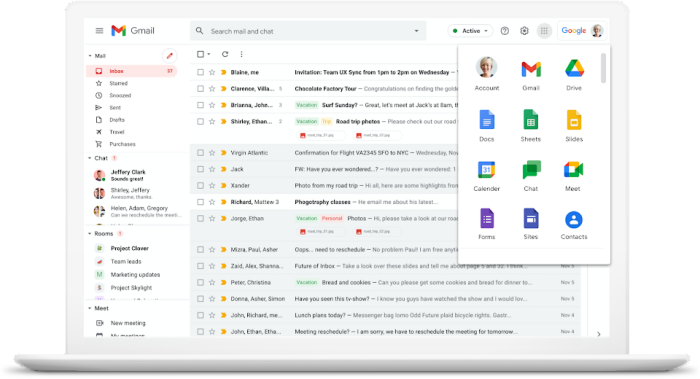
Pros
- Apps and services tightly packaged for small business
- Real-time collaboration
- Secured data and devices
Cons
- Help docs are not updated as often as the software
- Video conferencing tool needs improvement
Xero
Xero is small business accounting software that helps organize everything related to business in one place. Users can see their invoices, contacts, accounts, and reports in a single online platform. They can automate tasks, get a complete financial view of the business on demand, and make end-of-year tax returns hassle-free. The software is also customizable with add-ons and integrations.
Xero small business software assists owners so they can spend more time doing business. When connected to their bank, transactions automatically flow into the software so owners can reconcile transactions every day and get updated cash flow data. Collaboration is built-in, allowing users and their accountants and bookkeepers access the same up-to-date information. Employees can also submit expenses, manage leave, and send invoices.

Pros
- Simple online pay runs
- Income and expense tracking
- Great mobile app
Cons
- No phone support
- Users want additional integration options
Squarespace
Squarespace is a website builder with integrated POS system for small business. With e-commerce features added to a content-based website builder, the software provides tools to sell products and services easily, while also building the brand. It has a library of flexible website templates that users can customize to fit their business style and needs.
Squarespace also includes tools to let website visitors browse merchandise, manage their cart, and check out in a simple process with direct integration to global payment methods like Stripe, PayPal, and Apple Pay. It lets users accept in-person payments with Space hardware. The software is mobile-optimized, allows shopping on Instagram’s platform, and comes with built-in email marketing, shipping integrations, blogging and SEO tools, and business analytics. Other features include flexible fulfillment options, tax management, and limited availability alerts.
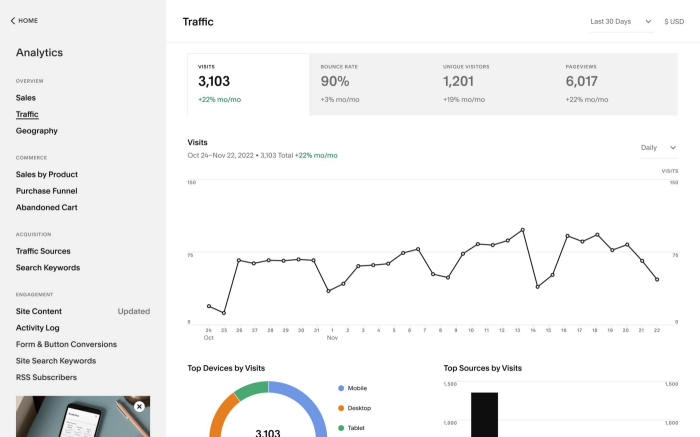
Pros
- Domain name search and management
- Website template library
- Combined content management and e-commerce systems
Cons
- Software upgrades can result in website re-design
- Full customization of code is not possible
Wrike
Wrike is versatile project management software for a range of use cases. It is viable small business software with a free plan for up to five users — ideal for startups. It can provide a work management solution for companies developing products or offering professional services. Users can customize its tools like dashboards, workflows, and automation to suit the needs of the company.
Wrike enables better collaboration, so a small organization can easily share files, tasks, and reports in real time. It has visual proofing, automated approvals, and shared calendars that ensure everyone follows processes. Multiple work views, task management, project templates, time tracking, resource management, in-app communication, reports, analytics, and integrations are some of its other features.
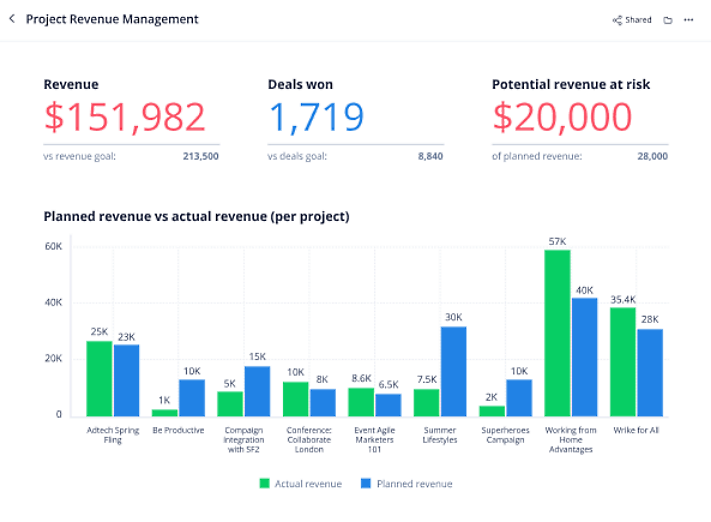
Pros
- Simple project planning and task management
- Project collaboration
- Powerful analytics
Cons
- Missing management of non-task, one-off items like events in calendars
- Users wish for a more visual way to create tasks or projects from forms
Asana
Asana is online work, project, and task management software for teams. With a free plan for up to 15 coworkers and scalable paid plans, it is one of the best apps for small business. Users get unlimited tasks, projects, messages, activity logs, and file storage to get the company organized and focused on work that matters.
Asana enables all teams, onsite and remote, to collaborate and manage work without effort. With built-in automation, users can work efficiently and streamline processes. Teams can save common projects as templates to develop best practices. The Status feature extracts important data into charts and visuals that users can easily report and share. Other features are request forms, multiple work views, and integrations.

Pros
- Task management and project collaboration
- Process management
- Intuitive interface
Cons
- Limited notification control and management
- Users want more customized ways to export data
Slack
Slack is a communication platform that enables companies to organize people, messages, and files in dedicated spaces called channels. It allows users to create a channel for every project, topic, or team so work is clearer and people can focus on the right work at the right time.
Slack offers a free plan (with limits) that can help small and starting businesses. Individuals or small groups within the organization can work on different projects, share resources, and move towards a common goal. The software lets users collaborate with people outside their company easily and securely. It also has voice and video calls, apps and integrations, file sharing, a workflow builder, mobile app, and search tool.
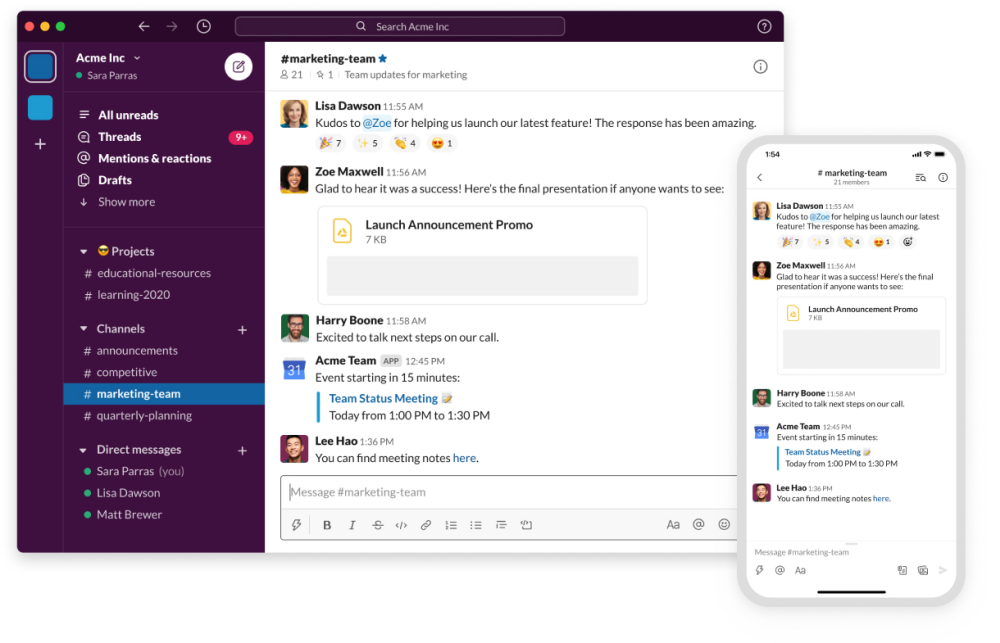
Pros
- Desktop and mobile apps
- Collaborative file and document sharing
- Ease of setup and use
Cons
- Video call quality needs improvement
- Occasional issues with notifications
HoneyBook
HoneyBook client management software for small business enables a company to manage projects, book clients, send invoices, and receive online payments within a single platform. Users can try it free for seven days, and all plans include unlimited clients, leads, and projects. The software also has free tools and resources for small businesses.
HoneyBook is an all-in-one solution that helps streamline everything a company needs to manage business in one platform. It has invoicing with secure digital payment processing, payment schedules and reminders, and proposals that include invoice, contract, and payment combined. The software also has project tracking, scheduling with shared calendars, file storage and management, contract management with online signatures, and client communication.
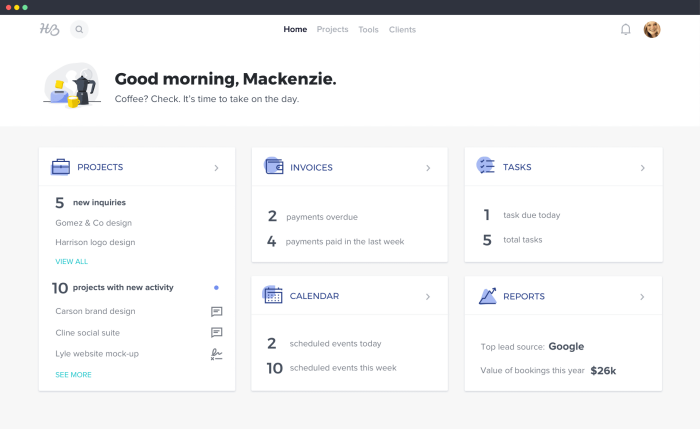
Pros
- Payment processing
- Time and expense reporting
- Responsive concierge support
Cons
- Needs time for familiarization
- Users wish for additional third-party integration options
Zoho One
Zoho One offers companies a single work operating system to replace multiple cloud applications. It is an integrated system to provide end-to-end business productivity software that spans sales, marketing, support, finance, HR, and operations. From a single solution, users can collect leads, close deals, create quotes, send invoices, sign contracts, get paid, and track metrics.
Zoho One includes over 40 integrated Zoho applications to manage, connect, and automate business processes. This includes Zoho Projects, Bookings, Marketing Automation, Survey, Forms, Sites, Commerce, Desk, Mail, Cliq, Sprints, Meeting, WorkDrive, Writer, Sheet, Show, Invoice, and others. It also has apps for tax, CRM, and inventory management for small business.
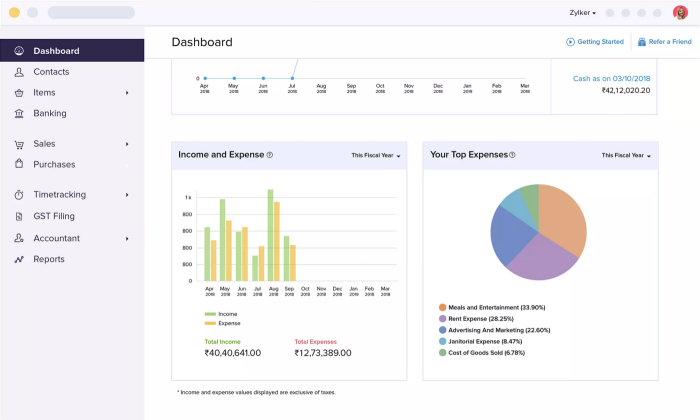
Pros
- All-in-one solution
- Seamless integration
- Templates and automation
Cons
- Occasional slowdown of system
- Limited dashboard view
Types of Small Business Software
Small businesses use a wide variety of software systems and tools to operate with efficiency. The types of small business software in use depends on several factors, such as principal needs, preference, priorities, and experience in using a system.
Project Management Software
Today’s project management software helps small businesses organize and break down big initiatives to smaller, more manageable activities and tasks. It provides excellent tracking features for project progress, but also for time, costs, budget, and workload. Real-time dashboards and reports are now common features in project management software, allowing users a better assessment of their projects and business in aggregate. Collaboration, automation, and integration are also built into these tools.
Collaboration and Productivity Applications
Some small businesses build their digital platforms on communication software to organize workflow and boost productivity. With tags, labels, and channels dedicated to separate projects or clients, communication applications facilitate clearer conversations, standardize business processes, and pave the way for smoother collaboration. Small businesses are able to search and share data faster, expand market horizons easily, and engage a bigger audience with confidence.
Integrated Accounting Software
Whatever the industry, a company needs accounting software to ensure the business is operating to achieve profit and growth. Many companies start with an integrated accounting system as the core of their small business tech stack to ensure it can accurately process payroll, pay taxes, and manage other financial aspects of the company such as cash flow, payables, receivables, profit, and loss.
CRM and Marketing Tools
Another type of small business software that companies are increasingly adopting are solutions that digitalize customer relationship management, establish an online presence, and facilitates electronic commerce for products or services. These tools drive business growth by streamlining processes, providing customers with better experience and access, and also giving business owners insights to improve their strategy.
Read more: Tips for How to Keep Clients Happy
Small Business Software Features
The best software for small businesses depends on many factors such as the type of business, market, industry trends, and competition. However, some common features will provide great advantages in most situations.
- Project and task management: Simplifies the accomplishment of day-to-day tasks and helps users prioritize, focus, and track their work.
- Communication: Helps clarify activities and goals with the internal team and provide stakeholders, external partners, and clients with updates.
- Business process automation: BPA improves the efficiency of company operations, whether engaging with prospects, supporting customers, starting a new project, or managing recurring tasks.
- Adaptability: Small businesses can actively compete at any level if their software allows them to be more flexible through scalability, customization, ease of use, and built-in analytics.
- Integration: Allows small businesses to add new functionality and extend the capabilities of their software at a minimum of cost and effort.
Read next: CRM Software for Small Business

